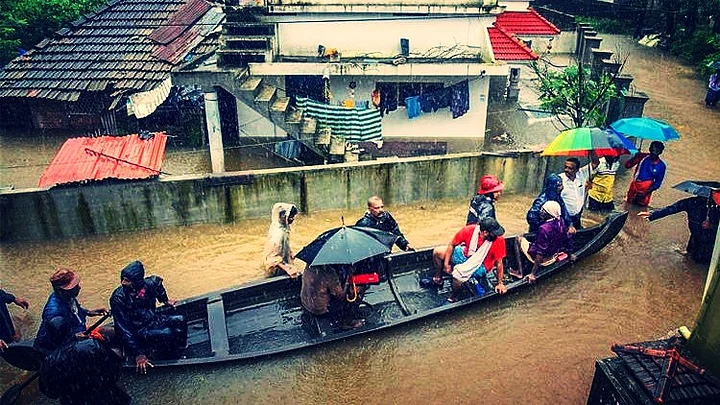The idea of free speech is both a wonderful and a terrible thing. It is the essence of a healthy democracy. Agree, disagree, argue till kingdom come. But how do you disagree, misunderstand, be hurt and still not take it personally and move on? And how often do you struggle to find empathy in the face of the most bigoted hate?
Hate Motivates Hate
Even as Kerala recently battled its worst ever floods in a century, and continues to try and rebuild itself, the amount of hate on social media has left me confused and heartbroken. Whether it is saying that lakhs of people deserved to lose their homes and families because of their eating habits, praying habits, the political party they voted to power, the amount of money they had or where they worked. Or on the other side, defending one’s ego, one’s state by calling people Fascist, questioning their motives, their allegiance to the government at the Centre, and calling them some more names.
Hate motivates hate, ending up in a never-ending, vicious circle, with no middle ground or scope for dialogue.
North or south, east or west, empathy is hard to find anywhere these days, and differences are easy to spar on. So, I write this, as a Tamilian, who grew up in Delhi, and I simply can’t wrap my head around the misplaced hate, the confusion and the misunderstanding, on both sides.
Celebrating Lohri & Going to Carnatic Concerts With Equal Gusto
Growing up in the 90s, there was no Internet and there were more reasons to not understand cultures we didn’t know. As a Tamil kid in Delhi, understanding the local culture, speaking fluent Hindi was key to survival in schools and playgrounds. And as with anyone trying to hold on to their roots in a different land, my mother made sure we spoke Tamil at home, went to music classes and the odd kacheris (Carnatic music concerts, for the uninitiated) and even had monthly subscription to Tamil magazines.
And with the same enthusiasm we celebrated Eid, Lohri and Christmas with the neighbours.
In the very middle -lass colonies of Sarojini Nagar and Patparganj, there was always a decency of not questioning the differences too much. When the Bhuj earthquake happened, when the Tsunami struck, everyone contributed – to the PM relief fund, in their offices, in schools, in the neighbourhood, whatever they could, wherever they could, without questioning. It was understood that there was nothing to question.
Being a Delhi ‘Ponnu’
When we went to the south for our summer holidays, I would try to impress my cousins and their friends by talking in Hindi and singing Hindi film songs. Impressed they probably were not, but yes, amused by the Delhi ponnu (‘girl’ in Tamil) for sure. My grandfather, who only spoke in English and Tamil, and read The Hindu when in Delhi, would insist on speaking in his highly-accented Hindi and ask for The Hindustan Times, when travelling in the south. It was a strange phenomenon.
But nobody said anything, questioned if we had fallen for the “Hindi propaganda”, called us traitors etc.
Now when you see all the questions and the hate, I can’t help but wonder, were those questions always there – but it just wasn’t polite to ask. You know what they say, if you don’t have anything nice to say, don’t say anything. And the way things stand, perhaps that’s not such a bad idea. But coming back to ‘did it always exist’ – I always thought it did for the politicians. The common person couldn’t care less.
Time for Introspection
Humour is a great way to deal with it. For the millennials at least. I see a lot of “ten things South Indians are sick of hearing” or “ten things not to say to a Punjabi” etc etc. A lot of slightly aggressive regional stand-ups have also been doing the rounds, and depending on where you are from, you may or may not agree with it. But what beyond the quick fix ten pointers and passive aggressive defending of habits?
How do you get a nation to introspect the hate coming out of them? I do not know. But I know one thing, nations are built on empathy and the ability to listen, and stay quiet sometimes.
To remember that while it is important to take a stand and one must take a stand, the stand can also be taken sitting down. Perhaps that’s what we need to do. Sit down for a moment and think of the devastation that our friends in Kerala are facing. Just for a moment, don’t blame, don’t point fingers. That’s the job of our politicians and debate anchors.
Like Elrond said in the Lord of the Rings “Yet such is oft the course of deeds that move the wheels of the world: small hands do them because they must, while the eyes of the great are elsewhere.”
We are the small hands, we are moving the wheels. So for now, move it in the direction of empathy and love. Donate if you can, pray if you believe, let go of your ego for a bit and remember to question – but nicely.
(Padmini Vaidyanathan is a second generation Delhi Tamilian who lives in Mumbai. Her heart beats equally to Daler Mehndi and AR Rahman. And if asked to choose between Idli and Chole Bhature, she will eat both, as there are no favourites. This is an opinion piece and the views expressed above are the author’s own. The Quint neither endorses nor is responsible for them.)
(At The Quint, we question everything. Play an active role in shaping our journalism by becoming a member today.)
